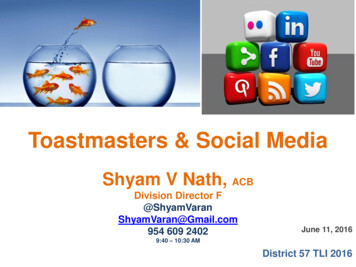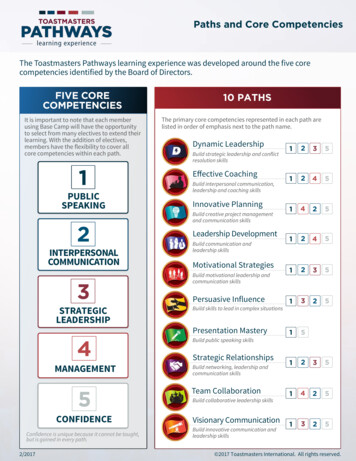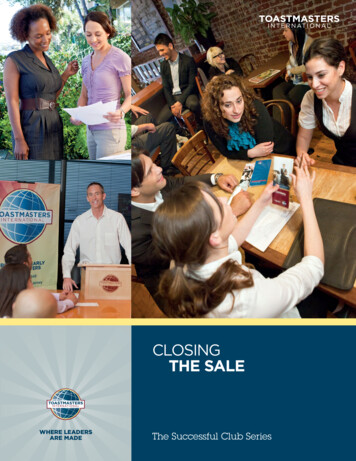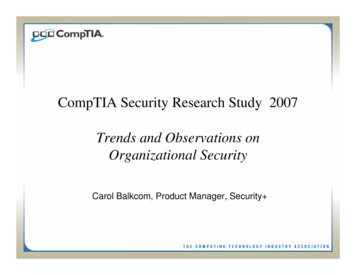
Transcription
members.toastmasters.orgClearing CambodiaTOASTMASTER October 2008Special Leadership IssueTheWoodenWayA legendary coach offerslessons in leadership.How to LeadWithout a TitleU.S. Election ’08:How Do theCandidatesCommunicate?
October 2008TABLE OF CONTENTSVolume 74, No. 10FEATURES&ARTICLESDEPARTMENTS2 Viewpoint: The Courage to Conquer GreatnessLeading Without AuthorityHow to influence others whenyou don’t have ‘position power.’By Dave ZielinskiPAGE 10By International President Jana Barnhill, DTM, AS4 Letters to the EditorThe Wooden Way6 My Turn: Bam! Fighting Off the FearsA legendary coach offerslessons in leadership.Toastmaster really cooks in “Emeril” taping.By Doug Palmer, CCBy Craig Harrison, DTMPAGE 168 Profile: Clearing CambodiaToastmaster speaks up for Cambodiansinjured by land mines.By Julie Bawden Davis24 Can We Talk? U.S. Election 2008:What to Look for in a Candidate’s SpeechLess show biz, more authenticity and relevantstandards are needed.By Bob Katz26 Manner of Speaking: CampaignMiscommunicationEven the most experienced speakerssuffer from foot-in-mouth disease.By Paul Sterman34 Update: A Winner in Many WaysHow Do the CandidatesCommunicate?Obama vs. McCain:Dramatically Different StylesBy Linda McGurkPAGE 20Oh, Calgary!Photos highlighting the recent 77thAnnual International Convention inCalgary, Alberta, Canada.PAGE 28TI’s 2008 World Champion of Public Speakingovercame big obstacles on her way to victory.By Paul Sterman and Beth BlackThe Toastmasters Vision:35 International Hall of Fame38 Funny You Should Say That:A Jargon of Our OwnLet’s hear it for the oral verbalizers.By John CadleyOn the Cover: John Wooden speaks at UCLA in 2003,at a ceremony honoring him and his late wife, Nell.See story on page 16.Toastmasters International empowers people to achieve their full potential and realizetheir dreams. Through our member clubs, people throughout the world can improvetheir communication and leadership skills, and find the courage to change.The Toastmasters Mission:Toastmasters International is the leading movement devoted to makingeffective oral communication a worldwide reality.Through its member clubs, Toastmasters International helps men and womenlearn the arts of speaking, listening and thinking – vital skills thatpromote self-actualization, enhance leadership potential, foster humanunderstanding, and contribute to the betterment of mankind.It is basic to this mission that Toastmasters International continuallyexpand its worldwide network of clubs thereby offering ever-greater numbersof people the opportunity to benefit from its programs.TOASTMASTEROctober 20083
“Mentors are available at all stages of your leadership life –early, middle and late. Seek them out and listen;absorb their knowledge and use it.”– John R. Wooden,Head Basketball Coach, Emeritus, University of California, Los AngelesA legendary coach offers lessons in leadership.The Wooden WayBy Craig Harrison, DTMWhen John Robert Wooden speaks,everyone listens – not only becausehe is considered the greatest collegebasketball coach of all time, but because hislegacy as a leader extends far beyond thebasketball court. Aside from having guidedhis University of California, Los Angeles(UCLA) teams to an unprecedented 10 U.S.national championships, Wooden is a highlyprincipled man and a master motivator whooffers invaluable insights about people andhow they can best work together.Recently, I interviewed the 97-year old marvel on thetopic of leadership. Coach Wooden shared his wisdomon team building, conflict resolution, giving credit, dealing with adversity and pursuing excellence. His teachingsare directly applicable to Toastmasters everywhere, bethey officers or future officers.Leading and Motivating TeamsThe Toastmaster magazine: How can our leaders motivatepeople to do good work, and how can they motivate teamsof people to work together toward a common goal?John Wooden: In my opinion, one of the greatest motivating tools we have is a pat on the back. It doesn’t have tobe a physical pat – it could be a smile, a nod. Everyonelikes to be complimented in one way or another.16TOASTMASTEROctober 20085 A reporter interviews John Wooden at UCLA, where hecoached from 1948 to 1975 and won an unprecedented10 U.S. national championships.
5 John Wooden speaks at UCLA in 2003, at a ceremonyhonoring him and his late wife, Nell. Earlier this year,the university’s Anderson School of Management established the John Wooden Global Leadership Award.Another technique is listening. A leader must listen tothose under their supervision. I believe that has beenoverlooked a lot. We don’t know a thing that we haven’tlearned from somebody else in one way or another. Andone of the ways we do that is by listening.1. Never be late. Always be on time. It’s very important.Whether to practice, to the table, to the bus, to yourclasses.2. You must never criticize a teammate. That’s theleader’s job. It’s never your job.3. I would not tolerate profanity from anyone, anytime. I’dblow the whistle, pull you from the court, put you on thebench and talk to you before I would put you back in.The Pursuit of ExcellenceTM: Each year our districts strive to achieve and/or main-Tips for New LeadersTM: Many Toastmasters members step, or are thrust, intoleadership positions for the first time. Do you have tips onhow they can build a cohesive team?JW: Again, the first thing is listening. Get ideas fromthem. Lead, don’t drive. And give credit. Don’t blame.If an officer on your team suggested something and itworked well, give them credit. If it doesn’t work well,you take the blame because you made the decision.Lastly, criticism must always be given in a gentle way,never harshly.[As a coach] I had three rules, as I progressed throughthe years, for my teams:Photos courtesy of Associated Students UCLAtain levels of excellence. You coached for 16 years atUCLA before you won your first national championship.Which was harder: climbing the mountain to win yourfirst national championship, or maintaining that level ofexcellence in subsequent years when you were the recognized king of the hill and expectations rose?JW: I think it’s far more difficult to get to the top. Youlearn so much along the way, not only with working withother people, but other little things that can help you.TM: As someone who has won at every level and setrecords that likely will never be broken, what is yourdefinition of success?October 2008TOASTMASTER17
JW: Too many people look at outscoring someone aswinning. I never tried to get that across to my players. Mybench never heard me mention winning. My wholeemphasis was for each one of my players to try to learn toexecute the fundamentals to the best of their ability. Not totry to be better than somebody else, but to learn from others, and never cease trying to be the best they could be;that’s what I emphasized more than anything else.I wanted to come up with something that I hopedwould make me a better teacher, and give those undermy supervision something with which to aspire, otherthan just higher marks in the classroom or more pointsin athletic endeavors.I coined my own definition of success. I used whatmy father said: “Never try to be better than someoneelse. Learn from others.” I ran across a simple verse atthat time that said:“At God’s footstool to confess, a“A good banker isn’t careless with pennies;poor soul knelt and bowed hishead. ‘I failed’ he cried. The mastera good leader isn’t sloppy about details.”said, ‘Though didst thy best. That– John R. Woodenis success.’”From those lines I coined myown definition of success in 1934:Pyramid of Success“Success is peace of mind attained only through self-satisTM: Your Pyramid of Success is an inspiration to menfaction in knowing you made the effort to become theand women around the world. How did you developbest of which you are capable.”your model of excellence?After a while I wasn’t happy with this definition. Myyoungsters didn’t seem to understand it very well. I felt IJW: When I was an English teacher, I found out someneeded to come up with something you could see. So Iparents made their youngsters feel they had failed if theystarted the Pyramid of Success, started it in 1934, completeddidn’t get an A or a B. I never liked that way to judge.it in 1948 when I was teaching at Indiana State UniversityNor do I like Mr. Webster’s definition of success, whichafter being discharged from the U.S. Navy in 1946.is more or less the accumulation of material possessionsAny structure must have a strong foundation; the coror the achievement of a position of power or prestige. Inerstones anchor the foundation. For some reason thedon’t question the accomplishments, but I don’t thinkcornerstones that I chose to begin [the Pyramid] with Ithey necessarily indicate success.never changed. I had a lot of ideas during those years.18TOASTMASTEROctober 2008
Changed some, dropped some, substituted somethingelse, and other names could be used, but never changedthe cornerstones.I think anyone’s success depends on working hard –industriousness and enthusiasm, enjoying what you aredoing. You can’t work your best if you’re not enjoying whatyou are doing. Those were the first two [cornerstones].And gradually I built the rest of the blocks. Betweenthe cornerstones I had friendship, loyalty and cooperation. Then I went up to self-control, alertness, initiativeand intentness. Then I went up to condition, skill andteam spirit. And those led up to poise and confidence.And it all went up to competitive greatness.And then with patience and faith you can get to thetop of the pyramid, which ismy definition of success.On Resolving ConflictTM: What advice do you havecloser to those two coaches than the others because weshared adversity. It was tough for us all.Club Presidents: Listen and Lead with LoveTM: What advice can you provide our thousands of club pres-idents – essentially the team captains – around the world, interms of leading their squads of officers and members?JW: I wanted mine to have a definite part. Your officersshould never be afraid to make a suggestion, but theyshould never be upset if the leader does not accept it.I also wanted my basketball players to know that Ireally cared about them. Forget basketball; as a person, Icared. I cared about their family. I want to know each“Effective leaders are, first and foremost, goodteachers. We’re in the education business.”in regards to resolving teamconflict?JW: Certainly conflict will arise. I think you have to getboth parties together and air everything out without trying to hold back anything – not be critical of either one,just try to listen to both sides and find out what mightbe the trouble. And sometimes you’ll find out it wasn’ttoo much at all. And it can be worked out without toomuch of a problem. Unless a problem is brought to theforefront, it will just continue to fester.– John R. Woodenday: How’s your mother? Did the job work out for yourdad? Did your brother or sister get that position?I think any leader should do this. You should reallycare. If you are fooling them, they will catch on.On PatienceTM: What else would you like Toastmasters leaders toknow in order to succeed?Cultivating Leadership in OthersJW: At the top of my pyramid: patience and faith!TM: What advice can you give today’s leaders about culti-Leaders must have patience for those under their supervision. Don’t expect too much too soon. Maybe it waseasy for you, but that doesn’t mean it’s going to be easyfor somebody else. Be sure you have patience.And then, you must believe in what you’re doing, thatwhat you’re doing is the proper thing, the right thing. Andyou must have faith that things will end up as they should,which doesn’t mean as you want them to, but things willwork out as they should. Providing, of course, that you dothe things that you should do to help it become that reality.I think we are all guilty at times of wanting things tohappen a certain way but not doing everything we arecapable of to help that become a reality. We just want itto. And that’s not life. That shouldn’t be life. Tvating leadership in others?JW: Make certain that you give those under your supervi-sion credit. Make sure that they receive very little criticism, but when there has to be some criticism, it mustbe done in a gentle way that will not be embarrassing,and definitely not in front of others. You may need totake them aside and talk it over, but never do so whileyou’re mad. No yelling; it has to be done in a gentlefashion, and with a pat on the back is the best.On Struggle and DifficultyTM: Any advice for leaders facing adversity or struggle ofsome kind on their teams or in their clubs?JW: Hardship brings people closer together if you shareit. When I first came to UCLA, we had to have basketballpractice for the first 17 years on the 3rd floor of the oldgym, with the gymnastics team on one side and thewrestling squad on another most of the time. I grewPast District Governor Craig Harrison, DTM, is amember of Lakeview Toastmasters in Oakland,California. A former high school basketball coach, heis the author of Cultivating the Leader in You and runsthe training firm Expressions of Excellence! Reach himat www.ExpressionsOfExcellence.com.October 2008TOASTMASTER19
The Wooden Way 5 A reporter interviews John Wooden at UCLA, where he coached from 1948 to 1975 and won an unprecedented 10 U.S. national championships. W hen John Robert Wooden speaks, everyone listens - not only because he is considered the greatest college basketball coach of all time, but because his legacy as a leader extends far beyond the










